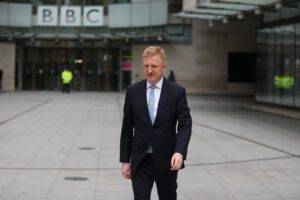
In the largest trade delegation from the UK in a decade, Oliver Dowden, the Deputy Prime Minister, led a significant British presence at the Great Futures event in Riyadh, Saudi Arabia.
This high-profile event kicked off with a unique performance of “Scotland the Brave” by the Royal Regiment of Scotland, combined with a local flute and drum group, setting a distinctive tone for the conference.
Dowden opened his address with a light-hearted reference to the excitement surrounding Tyson Fury’s boxing match in Riyadh, drawing a parallel to the high stakes of the business deals on the table. “Well I know that there is huge excitement about a British big hitter coming to Riyadh this week with people flying in from around the world to see him and billions of pounds on the line,” he quipped. “But that’s enough about me.”
Beyond the jokes, Dowden’s presence underscored the serious economic opportunities available for UK businesses in Saudi Arabia. The kingdom is investing trillions in projects to diversify its economy away from oil, including the ambitious Red Sea tourist resorts and the futuristic city of Neom, part of its Vision 2030 programme which aims to introduce extensive social and economic reforms.
The UK’s services sector, a major component of British exports to Saudi Arabia, is poised for expansion as the kingdom seeks to attract company headquarters, law firms, schools, and universities. Ten British schools are set to open in Saudi Arabia by 2030, and the University of Strathclyde in Glasgow is establishing a presence in Riyadh.
Lord Johnson of Lainston, Minister of State for Trade, expressed enthusiasm about the Saudi market’s openness, highlighting opportunities across various sectors. He noted that the UK is training 5,000 Saudi hospitality staff annually and discussed potential clusters for hospitality training in the northeast of England. Johnson also emphasized the growing educational exchange, with Saudi students doubling their numbers in the UK, enhancing cultural and economic ties.
Johnson, reflecting on his own career, suggested that Saudi Arabia now presents greater opportunities than traditional hubs like Hong Kong, particularly in sectors such as insurance and financial services, where the City of London can play a pivotal role.
However, the optimistic outlook comes with caution. Doing business in Saudi Arabia involves navigating bureaucratic challenges and conflicting goals among ministries. Moreover, the kingdom’s human rights record, including crackdowns on dissidents, continues to draw criticism. Despite these issues, Johnson believes in engaging with Saudi Arabia to capitalize on its rapid changes and vast economic potential.
The Saudi Crown Prince Mohammed bin Salman, popular among the kingdom’s youth for his social and economic reforms, remains a controversial figure due to human rights concerns. Nevertheless, Johnson asserts that engaging with the evolving kingdom represents a pragmatic and economically beneficial approach for the UK.
As UK businesses look to forge new partnerships and secure significant deals, the Great Futures event in Riyadh highlights both the opportunities and challenges of expanding into the rapidly transforming Saudi market.
Read more:
UK Businesses Eye Billions in Saudi Deals at Great Futures Event





